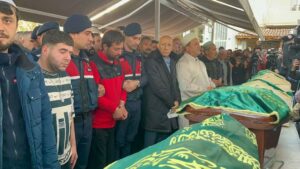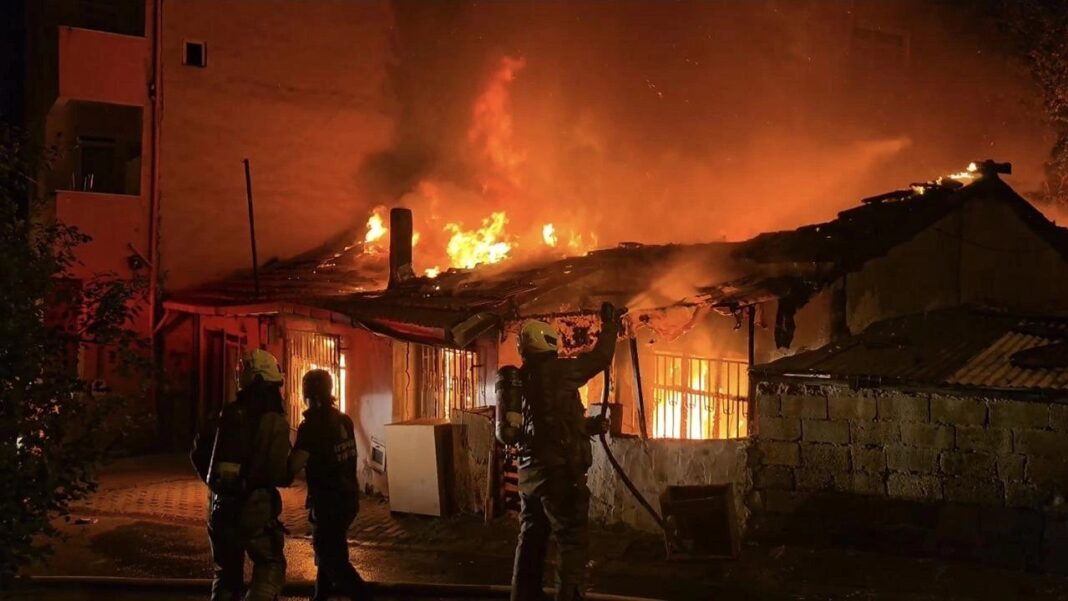The deaths of five young siblings between the ages one and five in a house fire in the Selçuk neighborhood of western İzmir province on Monday has led to widespread condemnation of the Turkish government’s management of poverty and social welfare, according to Turkish media reports.
The children’s father, Hakan Akcan, who is currently serving a prison sentence for theft, was temporarily released under guard and in restraints to attend the funeral. He was escorted to their funeral in handcuffs, in what some see as a symbolic portrait of the family’s harsh socioeconomic reality.

Photos of Akcan, handcuffed as he mourned his children, have stirred the public. Many described the scene as a haunting example of the desperation and helplessness of families struggling with poverty.
Devastating Fire in Izmir!
5 little siblings, the youngest of whom was 1 year old and the oldest of whom was 5 years old, died in a fire that broke out in Selçuk, İzmir due to an overturned electric stove!
It is learned that the children were alone at home during the fire and… pic.twitter.com/6gAwBWwXWU
— Keyfekeder (@Keyfekeder78) November 11, 2024
The fire, reportedly caused by an overturned electric heater, apparently ignited when the children’s mother, Melisa Akcan, briefly left them alone to collect scrap metal, her primary source of income after her husband’s imprisonment.
Heartbreak as house fire kills five young children while mum was out at work
The children, aged between one and five, were left at home in Turkey's western İzmir province on November 11 when they died from smoke inhalation after a fire broke out in the house RIP little ones pic.twitter.com/qdqhFi4gKu— hamish macdonald (@hamishmacdona18) November 13, 2024
The tragedy has once again put a spotlight on the precarious circumstances in which many families live. Critics claim that the government’s economic policy is driving citizens to the brink of the abyss.
5 children die in a fire at their home in #Izmir in western #Turkey. Their mother wasn't at home. Why?
Hacer Foggo, who works on "deep poverty" for decades explains: "Because the mom went collecting junk to buy food. Policies seeing poverty as food cards changes nothing." https://t.co/rbVDIYIOJj— Eylul Deniz (@eyluldenizjourn) November 12, 2024
The conditions of the Akcan family, who depend on scavenging to survive, exemplify a growing number of low-income households continuously struggling to cope with worsening economic conditions. Public anger centers on the lack of an effective social safety net and child protection services.
Observers say families’ reliance on hazardous heating solutions and the use of salvaged materials for survival point to systemic deficiencies in social support.
The Ministry of Family and Social Welfare has since confirmed that it has provided assistance to the family on 18 separate occasions. However, critics argue that these efforts were superficial and only provided temporary relief without addressing the root causes of poverty.
The children’s mother, 27-year-old Melisa Akcan, was briefly detained after the fire but was later released under judicial supervision. She reportedly told the authorities that she had only left the house for 15-20 minutes to get money from a scrap dealer. Her reliance on such risky working conditions has drawn attention to the desperation of many low-income families.
Opposition politicians and activists have pointed to the tragedy to call for accountability and reform. In an emotional speech, the leader of the Future Party, Ahmet Davutoğlu, who was visibly moved to tears, described the incident as a moral failure on the part of the ruling government.
“If drug use is now reaching primary school children, what is the value of quoting Quranic verses every day?” Davutoğlu asked.
Davutoğlu was responding to Özlem Zengin, deputy leader of the Justice and Development Party (AKP) parliamentary group, who had claimed that the incident had nothing to do with poverty, suggesting other causes. Davutoğlu criticized her remarks and argued that poverty and lack of opportunities do contribute to such tragedies.
The incident has reignited the debate on economic inequality in Turkey, as poverty and income disparities have reached alarming levels. Turkey has been grappling with a deepening cost-of-living crisis marked by high inflation and a depreciating currency.
The country’s poor have been hit the hardest by economic deterioration that saw the official annual inflation rate reach a decades-long high of 85 percent in October of 2022, according to official figures. The rate then fell, but it remains a significant concern. It stood at 48.6 percent in October, slowing less than anticipated, according to data from the Turkish Statistical Institute (TurkStat) released on Monday.
However, the Turkey Inflation Research Group (ENAG), an independent group of economists, indicated that annual inflation was much higher than was announced by TurkStat, standing at 89.7 percent in October.
The monthly cost of living in İstanbul currently averages 73,739 lira ($2,145) — a stark contrast to the subsistence level the Akcan family earned by collecting scrap metal.
The tragedy has also once again shown the limits of Turkey’s minimum wage policy.
Davutoğlu criticized recent remarks by IMF chief James Walsh, who advised Turkey to avoid excessive minimum wage hikes, arguing that such advice ignores the realities of workers’ lives. Davutoğlu called for the minimum wage to be adjusted to 33,337 lira ($970), an amount that would better align with inflation and prevent workers from falling further behind.
Human rights activists such as Hacer Foggo, founder of the Deep Poverty Network, argue that the government’s anti-poverty strategies are inadequate. Foggo emphasizes that current measures, such as the distribution of food parcels and small amounts of cash, do not address the underlying problems of housing insecurity, health care and social welfare. She argues that a rights-based approach that views poverty as a violation of basic human rights and includes measures that provide sustainable, long-term support is essential.
Calls for reform of the Ministry of Family and Social Affairs have become louder. Supporters call for temporary assistance to be replaced by comprehensive, stable support. Critics argue that without a robust social safety net, vulnerable families will continue to live in precarious circumstances, with children bearing the brunt of poverty-related risks.
Child poverty
Speaking to the Birgün daily, Dr. Ebru Basa of the Ankara Medical Association’s Public Health Commission said more than 6.5 million Turkish children live in extreme poverty.
UNICEF recently reported an increase in child labor, especially in urban areas. Child labor deaths, which used to be limited to agricultural regions, have become more common in cities as impoverished children are forced into factory work to support their families.
According to data of The Economic Policy Research Foundation of Türkiye (TEPAV), poverty is most prevalent among infants and children.
As of 2022, the poverty rate — defined as 60 percent of the median per capita income —was 41.4 percent for infants (0-2 years), 43.8 percent for children (3-14 years), 29.9 percent for young people (15-24 years), and 18.2 percent for those aged 25 and older.
The effects of this poverty are severe: malnutrition and inadequate healthcare are linked to developmental problems such as learning, walking and language difficulties.
The public reaction to the incident in İzmir was swift and widespread as many flooded social media with calls for stronger protections for vulnerable families. Users demanded justice for the children and accountability from government officials.
In a recent meeting, the main opposition Republican People’s Party Chairman Özgür Özel criticized the government’s economic policies and claimed that systemic poverty and lack of social support directly contributed to the children’s deaths.
Pro-Kurdish Peoples’ Equality and Democracy Party Co-Chair Tülay Hatimoğulları added that the AKP’s vision does not prioritize the working class and leaves families in precarious situations.
Critics expect financial hardships for low-income workers and pensioners to continue under current policies. The Pensioners’ Solidarity Union recently pointed out that many senior citizens are forced to return to work to make ends meet, leading to an increase in workplace deaths among older workers. Human rights advocates are calling for immediate action and emphasize the need for a living wage and safer working conditions for vulnerable populations.


